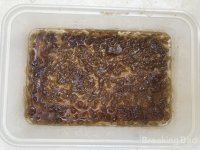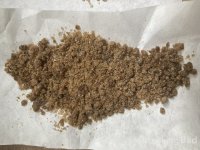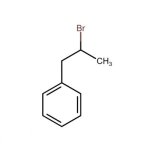Marvin "Popcorn" Sutton
Expert
- Joined
- Jul 25, 2021
- Messages
- 193
- Reaction score
- 290
- Points
- 63
The chemical synthesis of cathinones is facile and usually follows a two-step process. Typically, the initial synthesis is of an α-bromoketone (from the prerequisite arylketone) followed by a nucleophilic substitution with an appropriate amine to give the corresponding freebase of the cathinone. Due to the instability of the free- base, the cathinones are conveniently isolated as their corresponding hydrochloride or hydrobromide salts. This method could be adapted for the synthesis of a wide range of cathinones as shown in spoilers.
As can be seen from the diagrams above, the synthesis of cathinones is simple. The production of large amounts is quite easy to arrange, so they come out cheap to produce.
Ephedrone (CAS: 5650-44-2, C10H13NOH, 2-(methylamino)-1-phenylpropan-1-one, methcathinone, MetCat) is a short-acting stimulant that produces effects similar to those from chewing the leaves of the Khat plant. The precursor is propiophenone CAS: 93-55-0.

Flephedrone (CAS: 7598-35-7, C10H13ClFNO, 1-(4-fluorophenyl)-2-(methylamino)propan-1-one, 4-fluoromethcathinone or 4-FMC) is a central nervous system stimulant belonging to the amphetamines and cathinones class. The precursor is 4'-fluoropropiophenone CAS: 456-03-1.

Mephedrone (CAS: 1189805-46-6, C11H15NO, 1-Propanone, 2-(methylamino)-1-(4-methylphenyl)-, 2-(Methylamino)-1-(4-methylphenyl)-1-propanone, 2-Methylamino-1-p-tolylpropane-1-one, 4MMC, Meow meow, meph). Euphoretic, is widespread. Its effects have been compared to those of cocaine, methamphetamine and ecstasy. Precursor: 4'-Methylpropiophenone (CAS: 5337-93-9).
Example: http://bbzzzsvqcrqtki6umym6itiixfhn...-mephedrone-bromination-in-dichormethane.227/

Example: http://bbzzzsvqcrqtki6umym6itiixfhn...-mephedrone-bromination-in-dichormethane.227/
Methedrone (CAS:530-54-1, C11H15NO2, para-methoxymethcathinone, 4-methoxymethcathinone, bk-PMMA, PMMC, methoxyphedrine, 4-MeOMC). A substance in the class of amphetamines and cathinones. Chemically, methedrone is closely related to para-methoxymethamphetamine (PMMA), methylone and mephedrone. Precursor: 4'-Methoxypropiophenone (CAS: 121-97-1).

Methylone (CAS:186028-79-5, C11H13NO3, 3,4-methylenedioxy-N-methylcathinone, MDMC, βk-MDMA, M1). Methylone is a substituted cathinone analogue of MDMA and a 3,4-methylenedioxy analogue of methcathinone. The only structural difference between methylone and MDMA is the substitution of 2 hydrogen atoms for 1 oxygen atom in the β-position of the phenethylamine nucleus, forming a ketone group. The effects may be superior to MDMA. Precursor: 3,4-methylenedioxypropiophenone (CAS: 28281-49-4).
Example:

Example:
α-Pyrrolidinopentiophenone (CAS: 14530-33-7, C15H21NO, α-pyrrolidinovalerophenone, α-PVP, O-2387, β-keto-prolintane, prolintanone, or desmethylpyrovalerone) is a synthetic stimulant of the cathinone class. Precursor: valerophenone (CAS: 1009-14-9).

MDPV (CAS: 687603-66-3, C16H21NO3, 3,4-Methylenedioxypyrovalerone, methylenedioxypyrovalerone) acts as a powerful stimulant and causes effects similar to those of cocaine, methylphenidate and amphetamines. Causes irresistible craving for repeated taking. Typical doses range from 5-20 mg.

Attachments
Last edited by a moderator:






